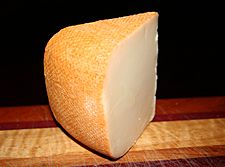Etorki facts for kids
Quick facts for kids Etorki |
|
|---|---|
 |
|
| Country of origin | France |
| Region | Basque country |
| Town | Mauléon-Licharre, Pyrénées-Atlantiques |
| Source of milk | sheep |
| Dimensions | 25 cm (diameter) x 11 cm (height) |
| Aging time | 7 weeks |
| Named after | Lua error in Module:Wikidata at line 70: attempt to index field 'wikibase' (a nil value). |
Etorki is a special kind of cheese that comes from the Basque Country in France. It's made in a town called Mauléon-Licharre, which is in the Pyrénées-Atlantiques area. This delicious cheese is made from sheep milk that has been pasteurized.
After the milk is collected, it's pressed into a firm block. The cheese is not cooked, but it is left to mature for about seven weeks. This aging process helps Etorki get its unique flavor and texture.
What is Etorki Cheese?
Etorki cheese is known for its smooth and soft texture. It feels almost velvety when you eat it. The cheese is shaped like a cylinder, which is like a can. Each piece is about 25 centimeters (10 inches) wide and 11 centimeters (4 inches) tall. These cheeses can weigh around 4.5 kilograms (10 pounds)!
How is Etorki Made?
Etorki cheese starts with fresh milk from sheep. The milk goes through a process called pasteurization. This means it's heated to kill any harmful germs, making it safe to eat. After pasteurization, the milk is turned into cheese curds. These curds are pressed together to form the cheese wheel.
The cheese wheels are then left to age in special rooms. This aging period lasts for about seven weeks. During this time, the cheese develops its rich, nutty, and slightly sweet taste. It's a firm cheese, but it's still very creamy.
Where Does Etorki Come From?
Etorki cheese comes from the French Basque Country. This region is in the southwestern part of France, near the border with Spain. It's a beautiful area with green hills and mountains. Sheep farming is very common here, which is why sheep milk cheeses like Etorki are so popular. The traditions of making cheese in this region go back a very long time.
See also
 In Spanish: Etorki para niños
In Spanish: Etorki para niños
 | Jessica Watkins |
 | Robert Henry Lawrence Jr. |
 | Mae Jemison |
 | Sian Proctor |
 | Guion Bluford |

